University ICT Project Management: Methodologies Comparison Report
VerifiedAdded on 2023/06/08
|7
|1091
|260
Report
AI Summary
This report delves into the realm of ICT project management, commencing with a definition of project methodologies and their crucial role in guiding projects. It then provides a comparative analysis of two prominent methodologies: PRINCE2 and PMBOK, highlighting their similarities and differences in terms of their approach, structure, and application. The report further explores the application of these methodologies within the project life cycle (PLC), outlining the distinct phases of each methodology and illustrating how they contribute to effective project management from initiation to closure. By examining these aspects, the report offers valuable insights into the practical implementation and benefits of each methodology, supporting informed decision-making in ICT project management.
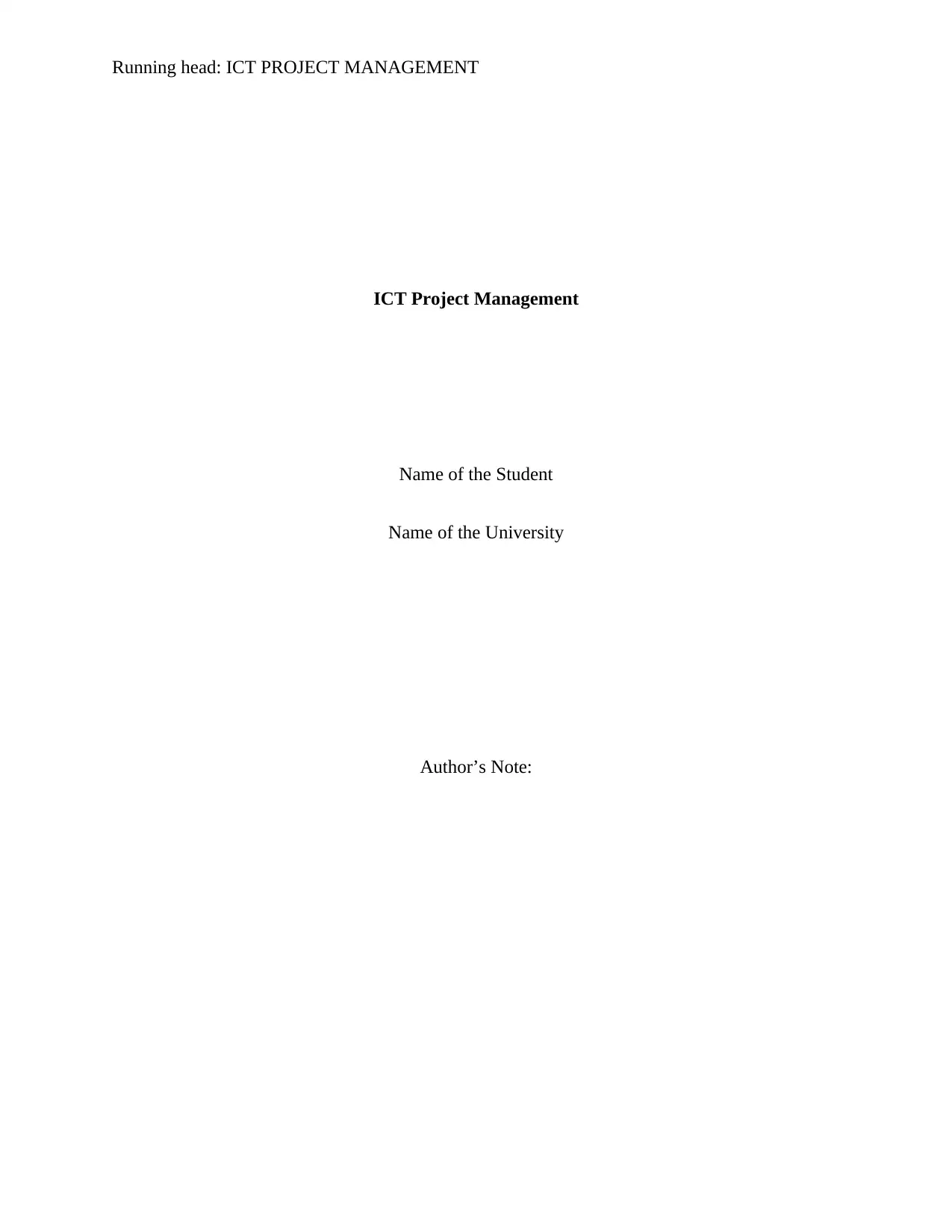
Running head: ICT PROJECT MANAGEMENT
ICT Project Management
Name of the Student
Name of the University
Author’s Note:
ICT Project Management
Name of the Student
Name of the University
Author’s Note:
Paraphrase This Document
Need a fresh take? Get an instant paraphrase of this document with our AI Paraphraser
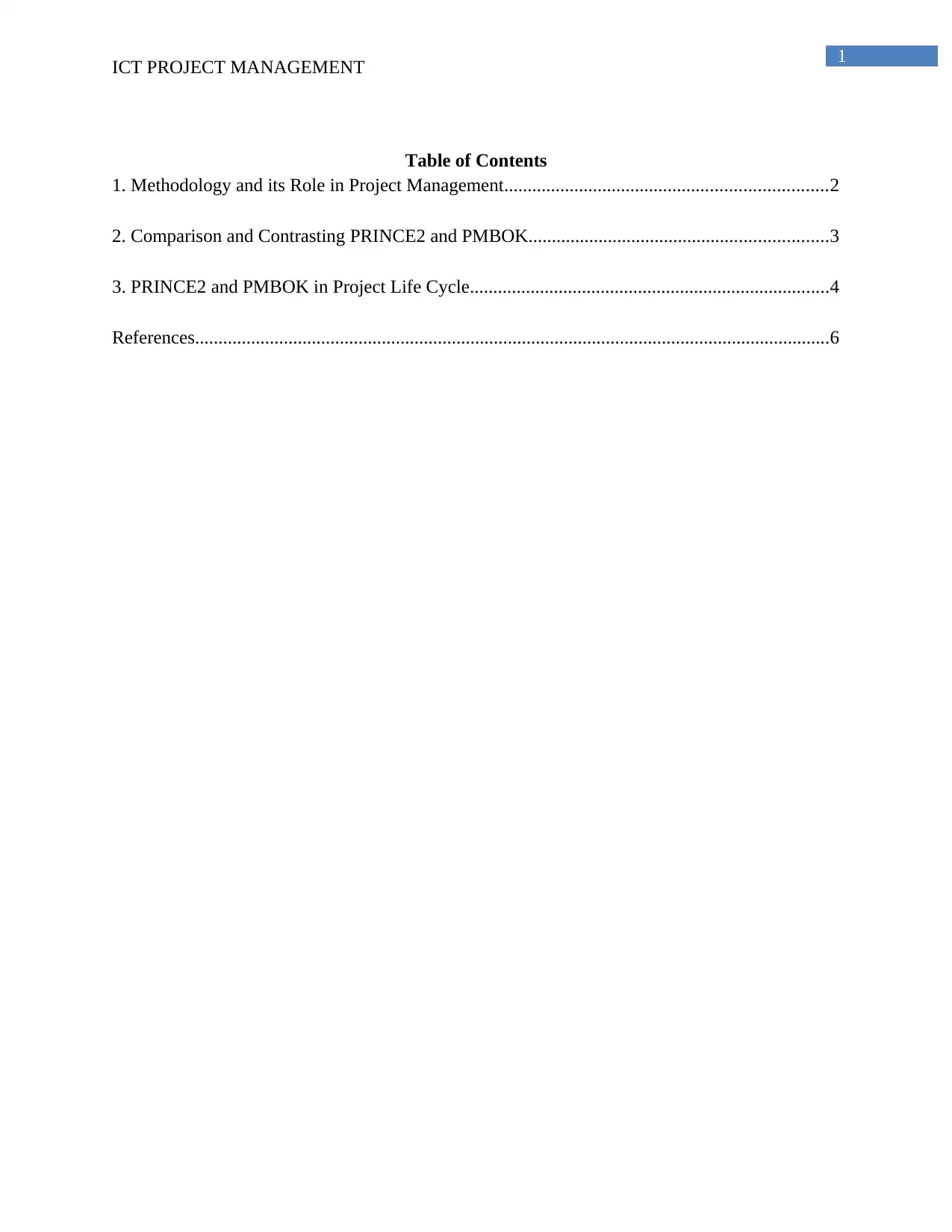
1
ICT PROJECT MANAGEMENT
Table of Contents
1. Methodology and its Role in Project Management.....................................................................2
2. Comparison and Contrasting PRINCE2 and PMBOK................................................................3
3. PRINCE2 and PMBOK in Project Life Cycle.............................................................................4
References........................................................................................................................................6
ICT PROJECT MANAGEMENT
Table of Contents
1. Methodology and its Role in Project Management.....................................................................2
2. Comparison and Contrasting PRINCE2 and PMBOK................................................................3
3. PRINCE2 and PMBOK in Project Life Cycle.............................................................................4
References........................................................................................................................................6
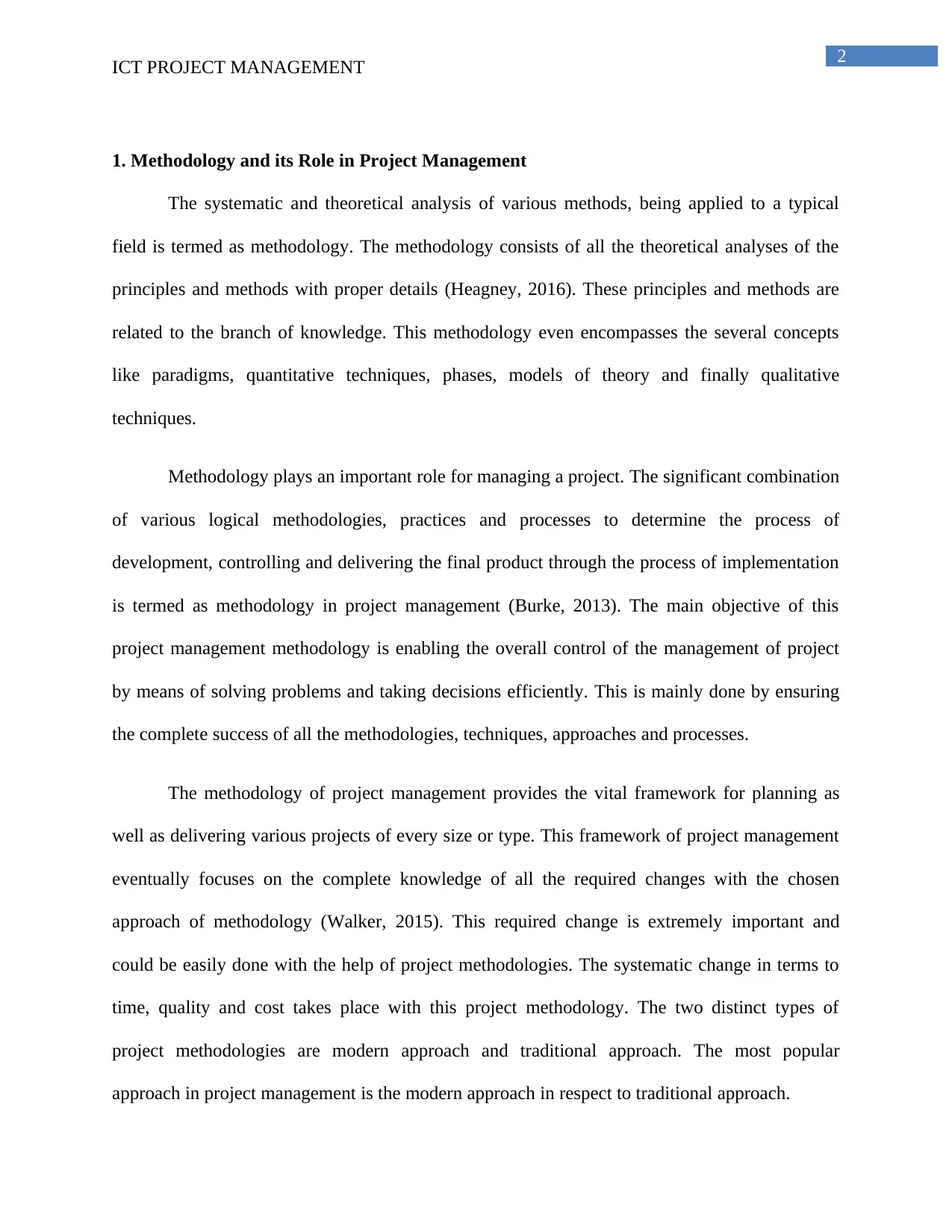
2
ICT PROJECT MANAGEMENT
1. Methodology and its Role in Project Management
The systematic and theoretical analysis of various methods, being applied to a typical
field is termed as methodology. The methodology consists of all the theoretical analyses of the
principles and methods with proper details (Heagney, 2016). These principles and methods are
related to the branch of knowledge. This methodology even encompasses the several concepts
like paradigms, quantitative techniques, phases, models of theory and finally qualitative
techniques.
Methodology plays an important role for managing a project. The significant combination
of various logical methodologies, practices and processes to determine the process of
development, controlling and delivering the final product through the process of implementation
is termed as methodology in project management (Burke, 2013). The main objective of this
project management methodology is enabling the overall control of the management of project
by means of solving problems and taking decisions efficiently. This is mainly done by ensuring
the complete success of all the methodologies, techniques, approaches and processes.
The methodology of project management provides the vital framework for planning as
well as delivering various projects of every size or type. This framework of project management
eventually focuses on the complete knowledge of all the required changes with the chosen
approach of methodology (Walker, 2015). This required change is extremely important and
could be easily done with the help of project methodologies. The systematic change in terms to
time, quality and cost takes place with this project methodology. The two distinct types of
project methodologies are modern approach and traditional approach. The most popular
approach in project management is the modern approach in respect to traditional approach.
ICT PROJECT MANAGEMENT
1. Methodology and its Role in Project Management
The systematic and theoretical analysis of various methods, being applied to a typical
field is termed as methodology. The methodology consists of all the theoretical analyses of the
principles and methods with proper details (Heagney, 2016). These principles and methods are
related to the branch of knowledge. This methodology even encompasses the several concepts
like paradigms, quantitative techniques, phases, models of theory and finally qualitative
techniques.
Methodology plays an important role for managing a project. The significant combination
of various logical methodologies, practices and processes to determine the process of
development, controlling and delivering the final product through the process of implementation
is termed as methodology in project management (Burke, 2013). The main objective of this
project management methodology is enabling the overall control of the management of project
by means of solving problems and taking decisions efficiently. This is mainly done by ensuring
the complete success of all the methodologies, techniques, approaches and processes.
The methodology of project management provides the vital framework for planning as
well as delivering various projects of every size or type. This framework of project management
eventually focuses on the complete knowledge of all the required changes with the chosen
approach of methodology (Walker, 2015). This required change is extremely important and
could be easily done with the help of project methodologies. The systematic change in terms to
time, quality and cost takes place with this project methodology. The two distinct types of
project methodologies are modern approach and traditional approach. The most popular
approach in project management is the modern approach in respect to traditional approach.
⊘ This is a preview!⊘
Do you want full access?
Subscribe today to unlock all pages.

Trusted by 1+ million students worldwide
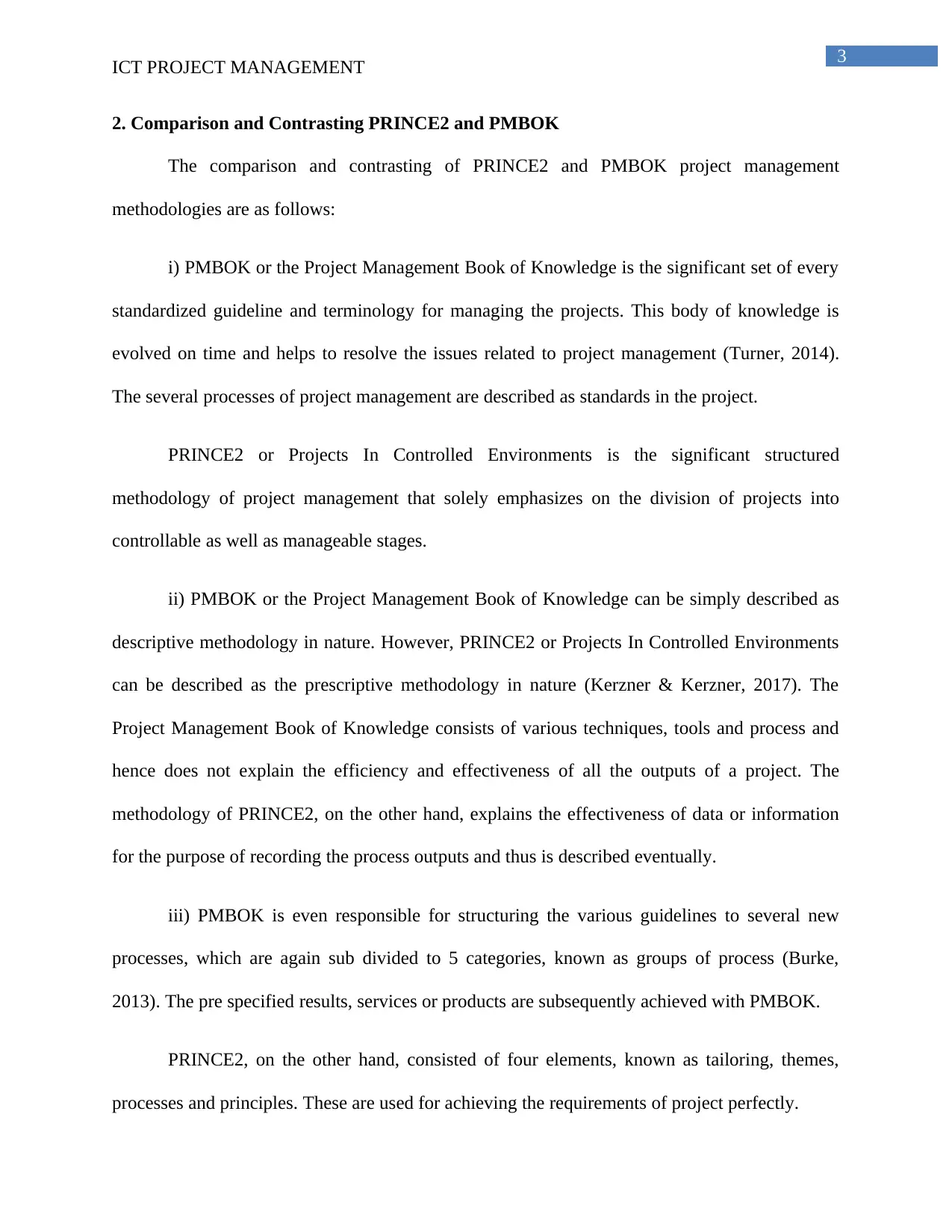
3
ICT PROJECT MANAGEMENT
2. Comparison and Contrasting PRINCE2 and PMBOK
The comparison and contrasting of PRINCE2 and PMBOK project management
methodologies are as follows:
i) PMBOK or the Project Management Book of Knowledge is the significant set of every
standardized guideline and terminology for managing the projects. This body of knowledge is
evolved on time and helps to resolve the issues related to project management (Turner, 2014).
The several processes of project management are described as standards in the project.
PRINCE2 or Projects In Controlled Environments is the significant structured
methodology of project management that solely emphasizes on the division of projects into
controllable as well as manageable stages.
ii) PMBOK or the Project Management Book of Knowledge can be simply described as
descriptive methodology in nature. However, PRINCE2 or Projects In Controlled Environments
can be described as the prescriptive methodology in nature (Kerzner & Kerzner, 2017). The
Project Management Book of Knowledge consists of various techniques, tools and process and
hence does not explain the efficiency and effectiveness of all the outputs of a project. The
methodology of PRINCE2, on the other hand, explains the effectiveness of data or information
for the purpose of recording the process outputs and thus is described eventually.
iii) PMBOK is even responsible for structuring the various guidelines to several new
processes, which are again sub divided to 5 categories, known as groups of process (Burke,
2013). The pre specified results, services or products are subsequently achieved with PMBOK.
PRINCE2, on the other hand, consisted of four elements, known as tailoring, themes,
processes and principles. These are used for achieving the requirements of project perfectly.
ICT PROJECT MANAGEMENT
2. Comparison and Contrasting PRINCE2 and PMBOK
The comparison and contrasting of PRINCE2 and PMBOK project management
methodologies are as follows:
i) PMBOK or the Project Management Book of Knowledge is the significant set of every
standardized guideline and terminology for managing the projects. This body of knowledge is
evolved on time and helps to resolve the issues related to project management (Turner, 2014).
The several processes of project management are described as standards in the project.
PRINCE2 or Projects In Controlled Environments is the significant structured
methodology of project management that solely emphasizes on the division of projects into
controllable as well as manageable stages.
ii) PMBOK or the Project Management Book of Knowledge can be simply described as
descriptive methodology in nature. However, PRINCE2 or Projects In Controlled Environments
can be described as the prescriptive methodology in nature (Kerzner & Kerzner, 2017). The
Project Management Book of Knowledge consists of various techniques, tools and process and
hence does not explain the efficiency and effectiveness of all the outputs of a project. The
methodology of PRINCE2, on the other hand, explains the effectiveness of data or information
for the purpose of recording the process outputs and thus is described eventually.
iii) PMBOK is even responsible for structuring the various guidelines to several new
processes, which are again sub divided to 5 categories, known as groups of process (Burke,
2013). The pre specified results, services or products are subsequently achieved with PMBOK.
PRINCE2, on the other hand, consisted of four elements, known as tailoring, themes,
processes and principles. These are used for achieving the requirements of project perfectly.
Paraphrase This Document
Need a fresh take? Get an instant paraphrase of this document with our AI Paraphraser
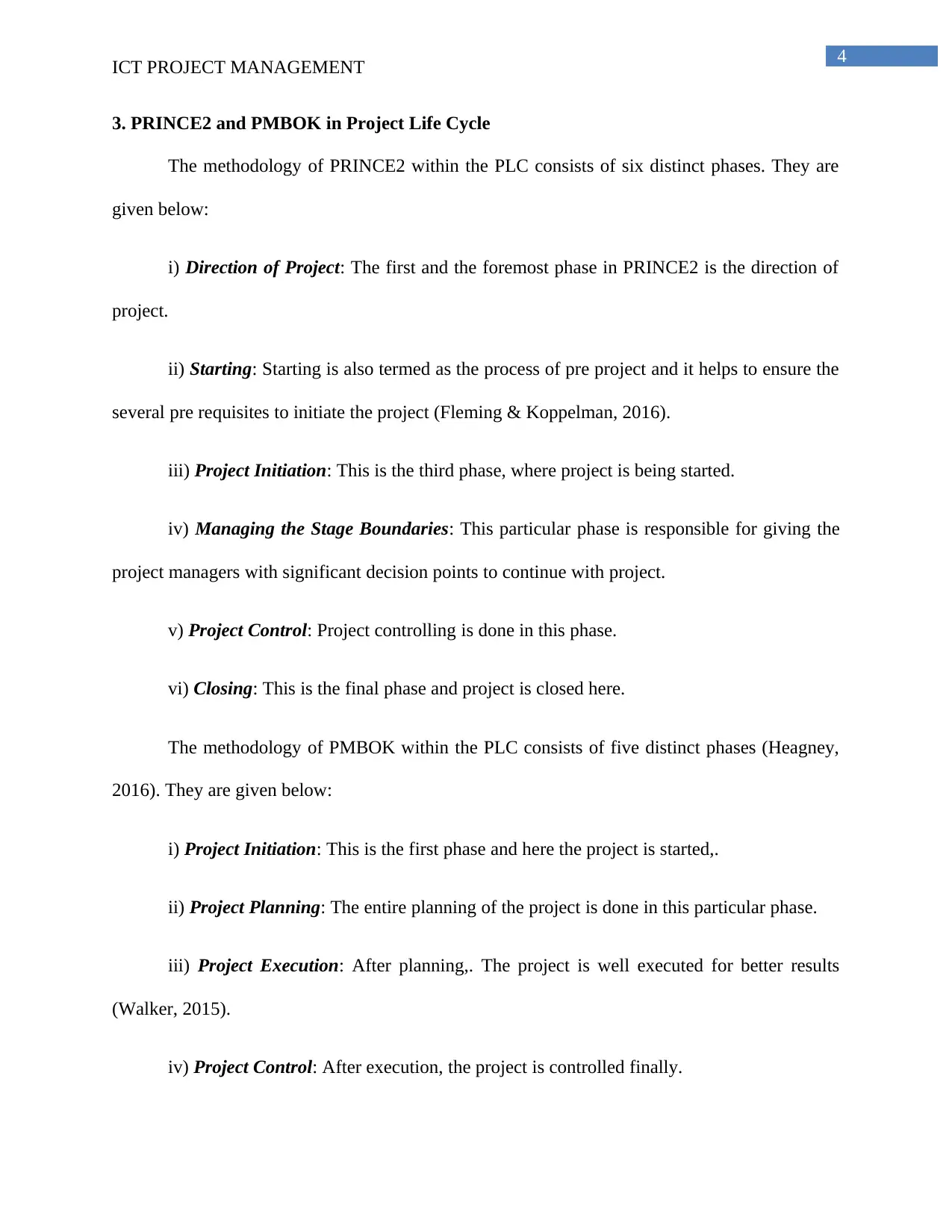
4
ICT PROJECT MANAGEMENT
3. PRINCE2 and PMBOK in Project Life Cycle
The methodology of PRINCE2 within the PLC consists of six distinct phases. They are
given below:
i) Direction of Project: The first and the foremost phase in PRINCE2 is the direction of
project.
ii) Starting: Starting is also termed as the process of pre project and it helps to ensure the
several pre requisites to initiate the project (Fleming & Koppelman, 2016).
iii) Project Initiation: This is the third phase, where project is being started.
iv) Managing the Stage Boundaries: This particular phase is responsible for giving the
project managers with significant decision points to continue with project.
v) Project Control: Project controlling is done in this phase.
vi) Closing: This is the final phase and project is closed here.
The methodology of PMBOK within the PLC consists of five distinct phases (Heagney,
2016). They are given below:
i) Project Initiation: This is the first phase and here the project is started,.
ii) Project Planning: The entire planning of the project is done in this particular phase.
iii) Project Execution: After planning,. The project is well executed for better results
(Walker, 2015).
iv) Project Control: After execution, the project is controlled finally.
ICT PROJECT MANAGEMENT
3. PRINCE2 and PMBOK in Project Life Cycle
The methodology of PRINCE2 within the PLC consists of six distinct phases. They are
given below:
i) Direction of Project: The first and the foremost phase in PRINCE2 is the direction of
project.
ii) Starting: Starting is also termed as the process of pre project and it helps to ensure the
several pre requisites to initiate the project (Fleming & Koppelman, 2016).
iii) Project Initiation: This is the third phase, where project is being started.
iv) Managing the Stage Boundaries: This particular phase is responsible for giving the
project managers with significant decision points to continue with project.
v) Project Control: Project controlling is done in this phase.
vi) Closing: This is the final phase and project is closed here.
The methodology of PMBOK within the PLC consists of five distinct phases (Heagney,
2016). They are given below:
i) Project Initiation: This is the first phase and here the project is started,.
ii) Project Planning: The entire planning of the project is done in this particular phase.
iii) Project Execution: After planning,. The project is well executed for better results
(Walker, 2015).
iv) Project Control: After execution, the project is controlled finally.

5
ICT PROJECT MANAGEMENT
v) Closing: Finally, the project is closed here.
ICT PROJECT MANAGEMENT
v) Closing: Finally, the project is closed here.
⊘ This is a preview!⊘
Do you want full access?
Subscribe today to unlock all pages.

Trusted by 1+ million students worldwide
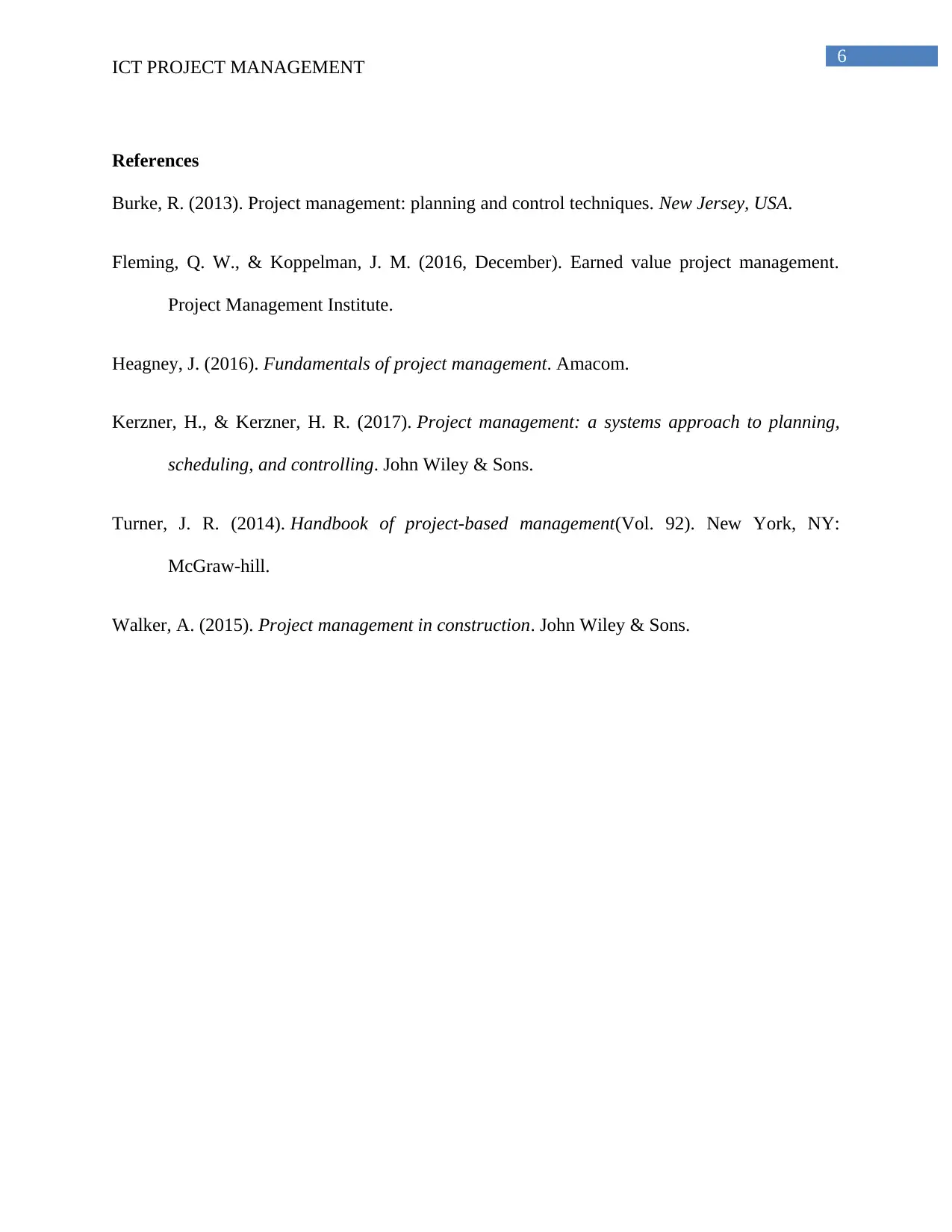
6
ICT PROJECT MANAGEMENT
References
Burke, R. (2013). Project management: planning and control techniques. New Jersey, USA.
Fleming, Q. W., & Koppelman, J. M. (2016, December). Earned value project management.
Project Management Institute.
Heagney, J. (2016). Fundamentals of project management. Amacom.
Kerzner, H., & Kerzner, H. R. (2017). Project management: a systems approach to planning,
scheduling, and controlling. John Wiley & Sons.
Turner, J. R. (2014). Handbook of project-based management(Vol. 92). New York, NY:
McGraw-hill.
Walker, A. (2015). Project management in construction. John Wiley & Sons.
ICT PROJECT MANAGEMENT
References
Burke, R. (2013). Project management: planning and control techniques. New Jersey, USA.
Fleming, Q. W., & Koppelman, J. M. (2016, December). Earned value project management.
Project Management Institute.
Heagney, J. (2016). Fundamentals of project management. Amacom.
Kerzner, H., & Kerzner, H. R. (2017). Project management: a systems approach to planning,
scheduling, and controlling. John Wiley & Sons.
Turner, J. R. (2014). Handbook of project-based management(Vol. 92). New York, NY:
McGraw-hill.
Walker, A. (2015). Project management in construction. John Wiley & Sons.
1 out of 7
Related Documents
Your All-in-One AI-Powered Toolkit for Academic Success.
+13062052269
info@desklib.com
Available 24*7 on WhatsApp / Email
![[object Object]](/_next/static/media/star-bottom.7253800d.svg)
Unlock your academic potential
Copyright © 2020–2026 A2Z Services. All Rights Reserved. Developed and managed by ZUCOL.





